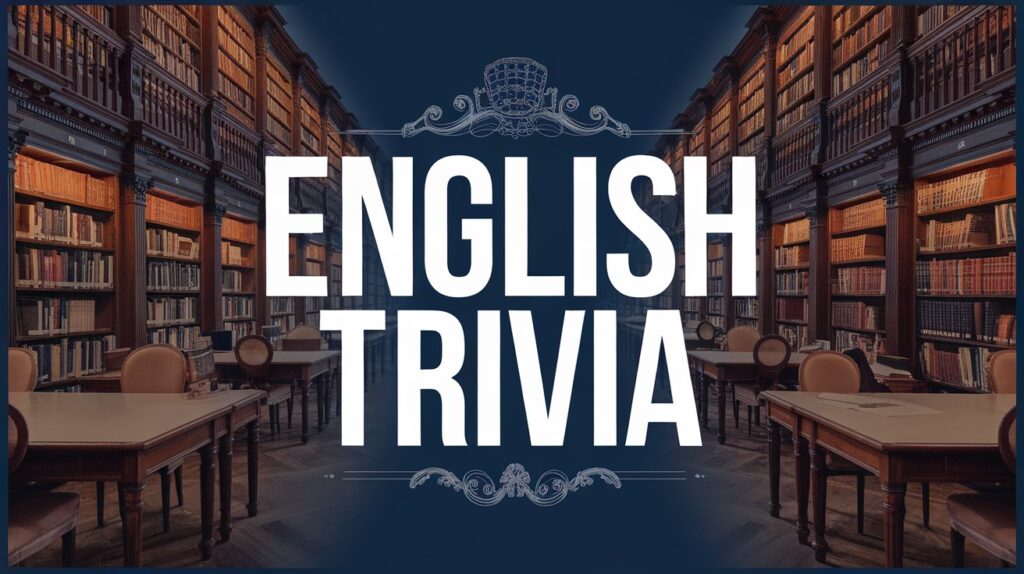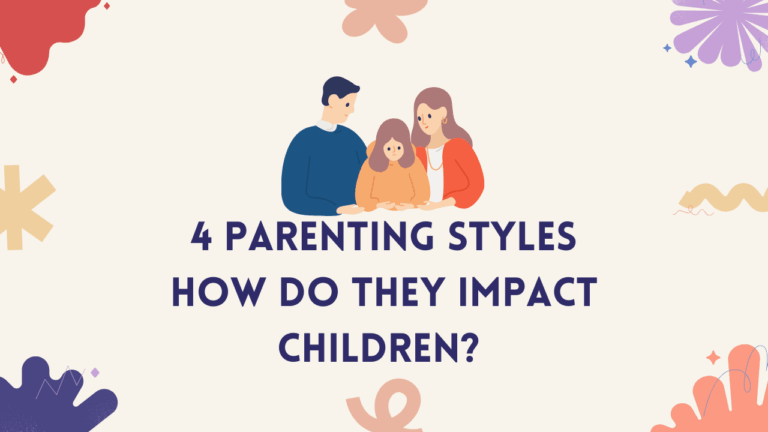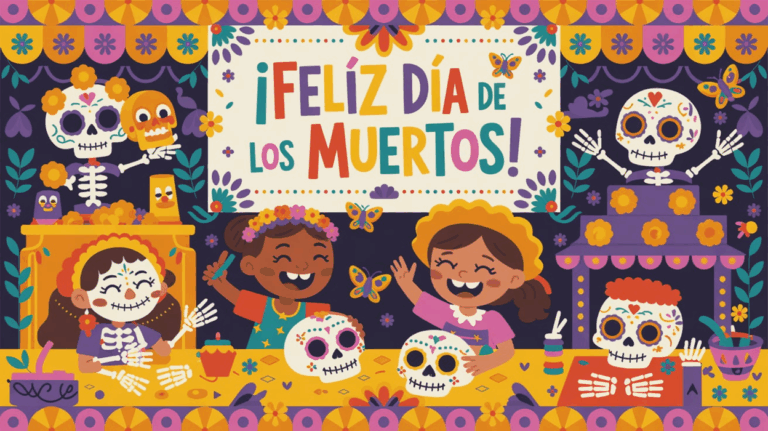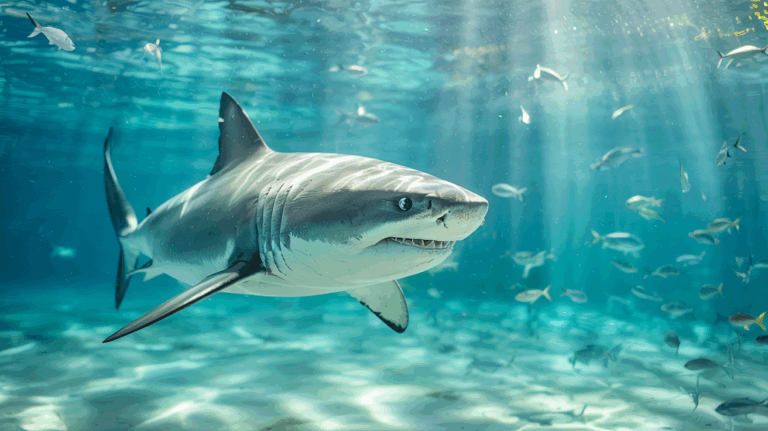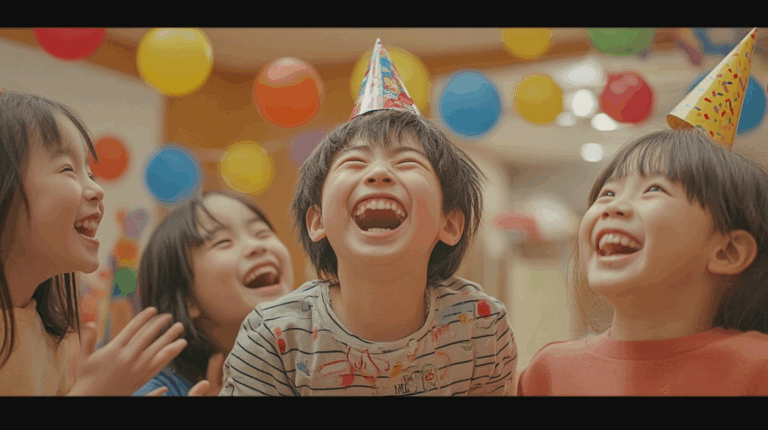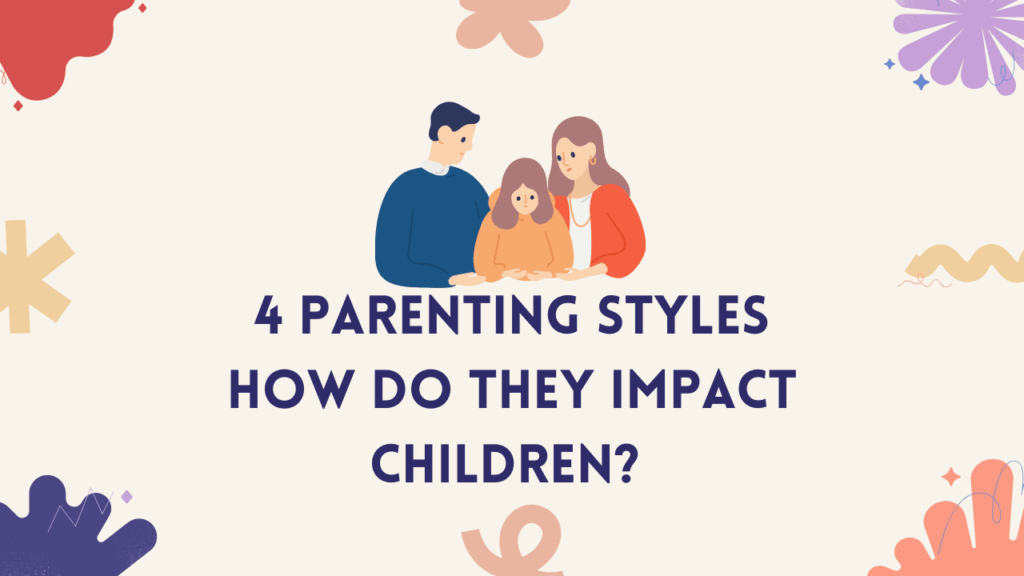Learning English can be hard work, and many students feel stuck at the same level despite years of study.
Even people who use English daily sometimes struggle with tricky vocabulary, confusing grammar rules, and proper sentence structure.
Testing your knowledge with well-designed questions helps identify gaps in your understanding and builds confidence in your language abilities. With the right practice tools, you can improve your English skills in an effective and fun way.
In this collection of 175+ English trivia questions, you’ll find carefully selected challenges covering grammar, vocabulary, literature, and proper writing techniques.
These questions range from basic to advanced levels, making them perfect for both English learners and native speakers who want to strengthen their language skills.
Basic English Knowledge
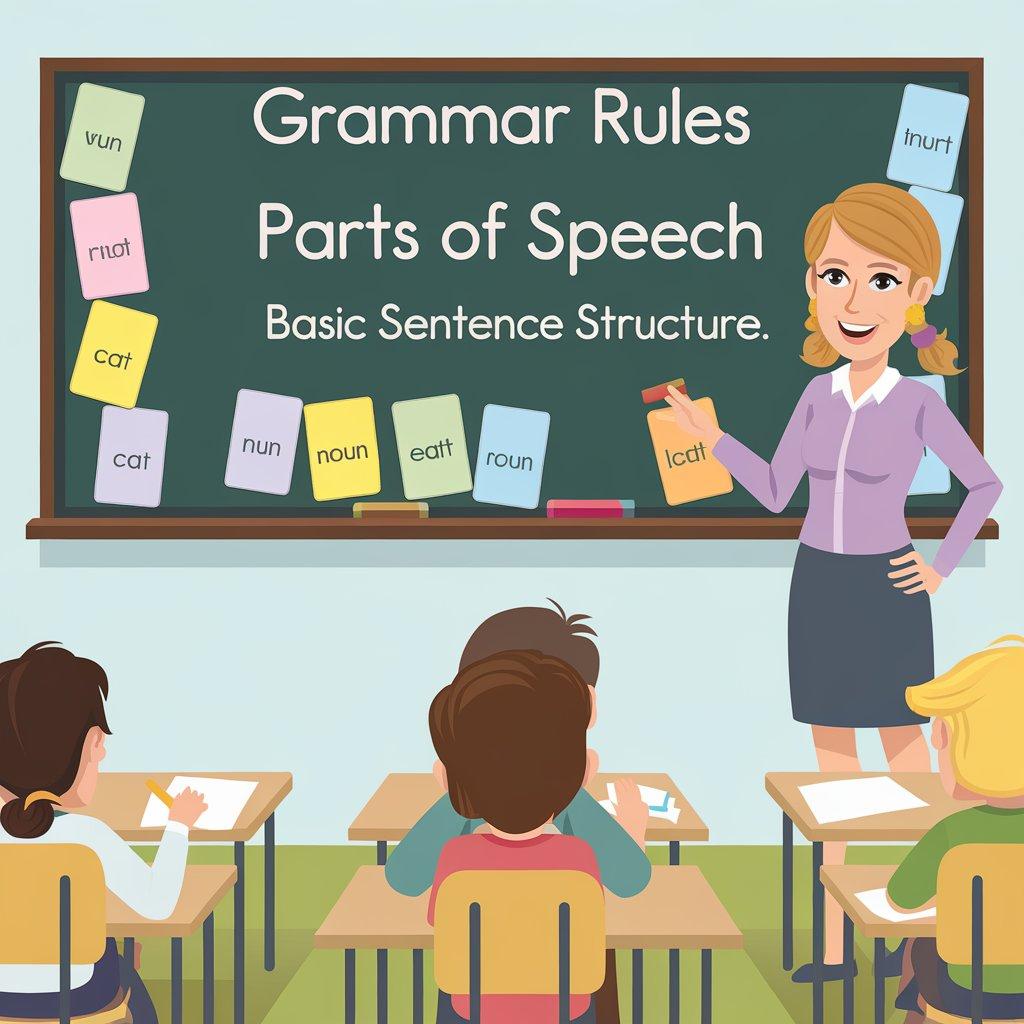
- What is the longest word in the English language without a vowel?
Answer: Rhythm - How many letters are in the English alphabet?
Answer: 26 - What is the most commonly used letter in the English language?
Answer: E - Which English word has the most definitions?
Answer: Set - What is the shortest word in the English language with all five vowels?
Answer: Eunoia - How many tenses are there in English grammar?
Answer: 12 - Which word in English has the most letters?
Answer: Pneumonoultramicroscopicsilicovolcanoconiosis - What is the difference between a homophone and a homonym?
Answer: A homophone sounds the same as another word but has a different meaning, while a homonym has the same spelling and pronunciation but different meanings. - What is the plural of “goose”?
Answer: Geese - Which word is both a noun and a verb in English?
Answer: Run - What is the past tense of “swim”?
Answer: Swam - What is the longest word in the dictionary?
Answer: Pneumonoultramicroscopicsilicovolcanoconiosis - Which letter is silent in the word “knife”?
Answer: K - What is a pangram in English?
Answer: A sentence that uses every letter of the alphabet at least once. Example: “The quick brown fox jumps over the lazy dog.” - What is the longest English word without repeating any letters?
Answer: Subdermatoglyphic - How many vowels are there in the English alphabet?
Answer: 5 (A, E, I, O, U) - What do we call a word that is similar in meaning to another word?
Answer: Synonym - What is the plural of “child”?
Answer: Children - Which word is used to describe a word that sounds like another but has a different meaning?
Answer: Homophone - What is the term for a word that is opposite in meaning to another word?
Answer: Antonym - Which part of speech is “quickly”?
Answer: Adverb - What is the term for the position of words in a sentence (subject, verb, object)?
Answer: Syntax - What do you call a word that is formed by taking parts of other words (like “brunch”)?
Answer: Portmanteau - What is the term for a word that is opposite in meaning to another word?
Answer: Antonym - Which tense is used for something happening right now?
Answer: Present tense - What is an idiom in the English language?
Answer: A phrase whose meaning is different from the literal interpretation, such as “kick the bucket.” - How do you form a question in English?
Answer: By inverting the subject and auxiliary verb (e.g., “Are you coming?”) - What is the word for a story that involves imaginary events?
Answer: Fiction - Which part of speech is “slowly”?
Answer: Adverb - How many syllables does the word “banana” have?
Answer: 3
Grammar and Syntax
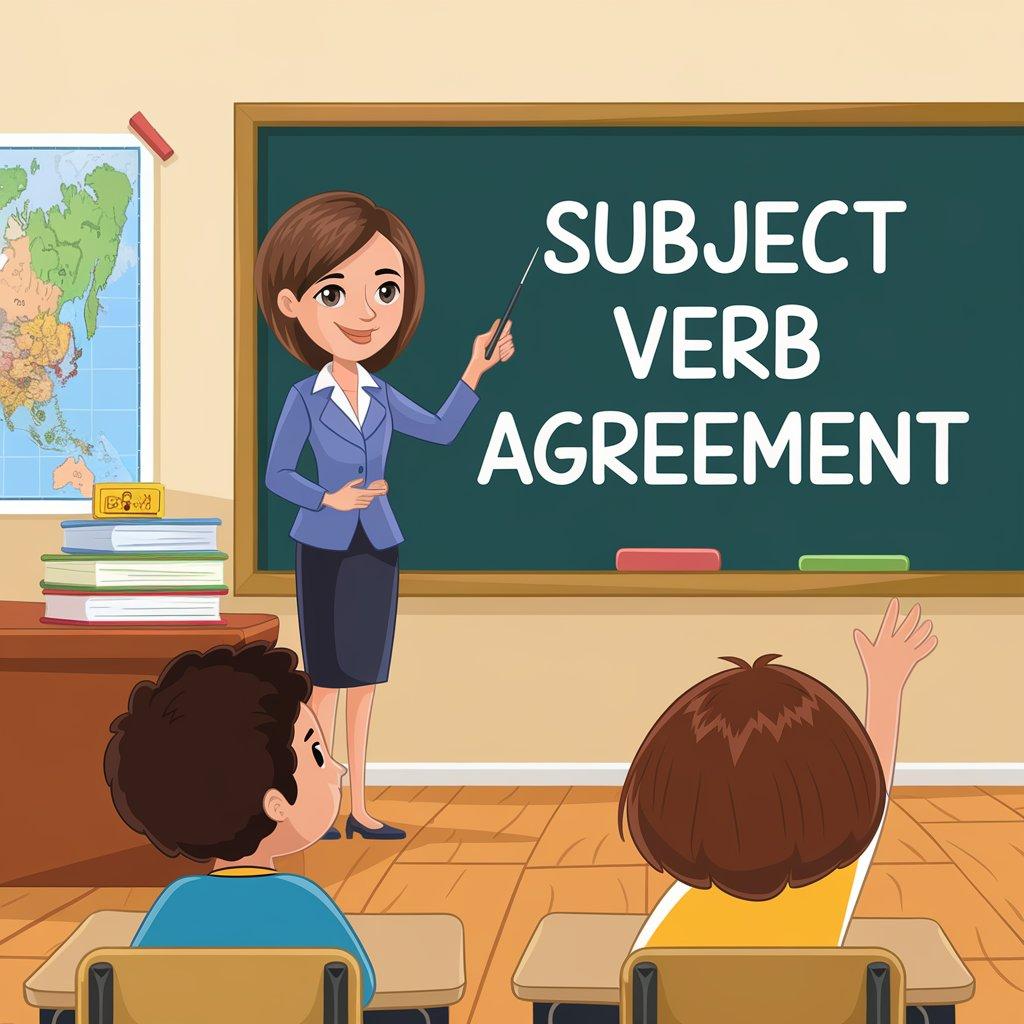
- What is the difference between “its” and “it’s”?
Answer: “Its” is a possessive pronoun, while “it’s” is a contraction for “it is.” - What does “subject-verb agreement” mean in English?
Answer: It means that the subject and verb in a sentence must agree in number (singular or plural). - What is the past perfect tense used for?
Answer: To describe an action that was completed before another action in the past. (e.g., “I had finished before she arrived.”) - What is the proper way to use commas in a list?
Answer: Commas separate items in a list, and a comma before the final item is optional in American English (e.g., “I bought apples, bananas, and oranges.”) - What is an adjective in English grammar?
Answer: A word that describes a noun (e.g., “beautiful,” “fast”). - What is the term for a sentence that expresses a complete thought?
Answer: An independent clause - What is the function of an adverb in a sentence?
Answer: It modifies a verb, adjective, or other adverb, typically describing how, when, where, or to what extent an action occurs. - How do you form the passive voice in English?
Answer: By making the object of an action the subject of the sentence and using a form of “to be” plus the past participle of the verb (e.g., “The cake was eaten by him.”) - What is a compound sentence?
Answer: A sentence that has two or more independent clauses connected by a conjunction (e.g., “I wanted to go, but it was raining.”) - How do you form the future tense in English?
Answer: By using “will” or “shall” plus the base form of the verb (e.g., “I will go.”) - What is the difference between “who” and “whom”?
Answer: “Who” is a subject pronoun, while “whom” is an object pronoun. - What is the role of an article in English grammar?
Answer: An article (a, an, the) is used to define the noun as specific or unspecific. - What is an example of a coordinating conjunction?
Answer: And, but, or, nor, for, so, yet - What is the difference between “since” and “for” in English grammar?
Answer: “Since” refers to a specific point in time, while “for” refers to a duration of time. - What is a preposition in English?
Answer: A word that shows the relationship between a noun (or pronoun) and another word in the sentence (e.g., “in,” “on,” “under”). - What is the comparative form of “good”?
Answer: Better - What is an interjection in English grammar?
Answer: A word or phrase used to express a strong emotion or sudden exclamation (e.g., “Wow!” “Oops!”) - What is the plural of “cactus”?
Answer: Cacti - What is a conjunction in English grammar?
Answer: A word that connects words, phrases, or clauses (e.g., “and,” “but,” “because”). - What is the superlative form of “fast”?
Answer: Fastest - What is an example of a subordinating conjunction?
Answer: Because, although, since, if - How do you form a question in the past tense?
Answer: By using “did” plus the base form of the verb (e.g., “Did you go?”) - What is an example of a possessive noun?
Answer: John’s, teacher’s, dog’s - What is the role of a subject in a sentence?
Answer: The subject is the person, place, thing, or idea that is doing or being something in the sentence. - What is an example of an infinitive verb?
Answer: To run, to eat, to sleep - What is a gerund?
Answer: A verb form ending in “-ing” that functions as a noun (e.g., “Swimming is fun.”) - What is the past participle of “eat”?
Answer: Eaten - What is the function of a relative pronoun?
Answer: It introduces a relative clause and connects it to the main clause (e.g., “who,” “which,” “that”). - What is the difference between “affect” and “effect”?
Answer: “Affect” is a verb meaning to influence, while “effect” is a noun meaning a result. - What is the term for a sentence that contains a question?
Answer: An interrogative sentence - What is the difference between “farther” and “further”?
Answer: “Farther” refers to physical distance, while “further” refers to metaphorical or figurative distance (e.g., “I can’t go any farther” vs. “We need to discuss this further”). - What is a direct object in a sentence?
Answer: A noun or pronoun that receives the action of the verb (e.g., “She read the book” – “book” is the direct object). - What is an indirect object?
Answer: The noun or pronoun that receives the direct object (e.g., “She gave him the book” – “him” is the indirect object). - What is an example of a demonstrative pronoun?
Answer: This, that, these, those - What is the difference between “much” and “many”?
Answer: “Much” is used with uncountable nouns, while “many” is used with countable nouns. - What is the term for a sentence that gives a command or request?
Answer: An imperative sentence - What is the difference between “borrow” and “lend”?
Answer: “Borrow” means to take something temporarily, while “lend” means to give something temporarily. - What is the function of a reflexive pronoun?
Answer: A reflexive pronoun refers back to the subject of the sentence (e.g., “I did it myself”). - What is the past tense of “bring”?
Answer: Brought - What is a split infinitive?
Answer: A construction where an adverb or other word separates “to” from the base form of the verb (e.g., “to boldly go” instead of “to go boldly”). - What is an appositive?
Answer: A noun or noun phrase that renames another noun right beside it (e.g., “My friend, the doctor, will join us”). - What is an auxiliary verb?
Answer: An auxiliary verb helps form different tenses, moods, or voices of the main verb (e.g., “am,” “is,” “are,” “have,” “do”). - What is the function of a conjunction?
Answer: A conjunction connects words, phrases, or clauses (e.g., “and,” “but,” “or”). - What is the superlative form of “happy”?
Answer: Happiest - What is the past tense of “run”?
Answer: Ran - What is the difference between “lay” and “lie”?
Answer: “Lay” means to place something down, and “lie” means to recline or rest. - What is the function of an interjection?
Answer: An interjection expresses a strong emotion or sudden feeling (e.g., “Wow!” “Oh no!”). - What is the past tense of “teach”?
Answer: Taught - What is a conditional sentence?
Answer: A sentence that expresses a condition and its possible result (e.g., “If it rains, we will stay home”). - What is a sentence fragment?
Answer: A group of words that does not express a complete thought, often missing a subject or verb. - What is an example of a collective noun?
Answer: Team, family, audience - What is the term for a word that is spelled the same but has different meanings?
Answer: Homograph (e.g., “lead” as in “to guide” vs. “lead” as the metal). - What is a dangling modifier?
Answer: A modifier that is not clearly or logically related to the word it is supposed to modify (e.g., “Walking through the door, the book fell”). - What is the difference between “accept” and “except”?
Answer: “Accept” means to receive, while “except” means to exclude. - What is an example of a prepositional phrase?
Answer: “Under the table,” “in the park,” “on the chair” - What is a coordinating conjunction?
Answer: A conjunction that connects words, phrases, or clauses of equal importance (e.g., “and,” “but,” “or”). - What is the difference between “affect” and “effect”?
Answer: “Affect” is a verb meaning to influence, and “effect” is a noun meaning a result. - What is an interrogative sentence?
Answer: A sentence that asks a question (e.g., “What time is it?”). - What is a compound-complex sentence?
Answer: A sentence that has at least two independent clauses and one or more dependent clauses (e.g., “I wanted to go, but because it was late, I stayed home”). - What is the difference between “who” and “whom”?
Answer: “Who” is used as a subject, while “whom” is used as an object in a sentence.
Advanced Grammar
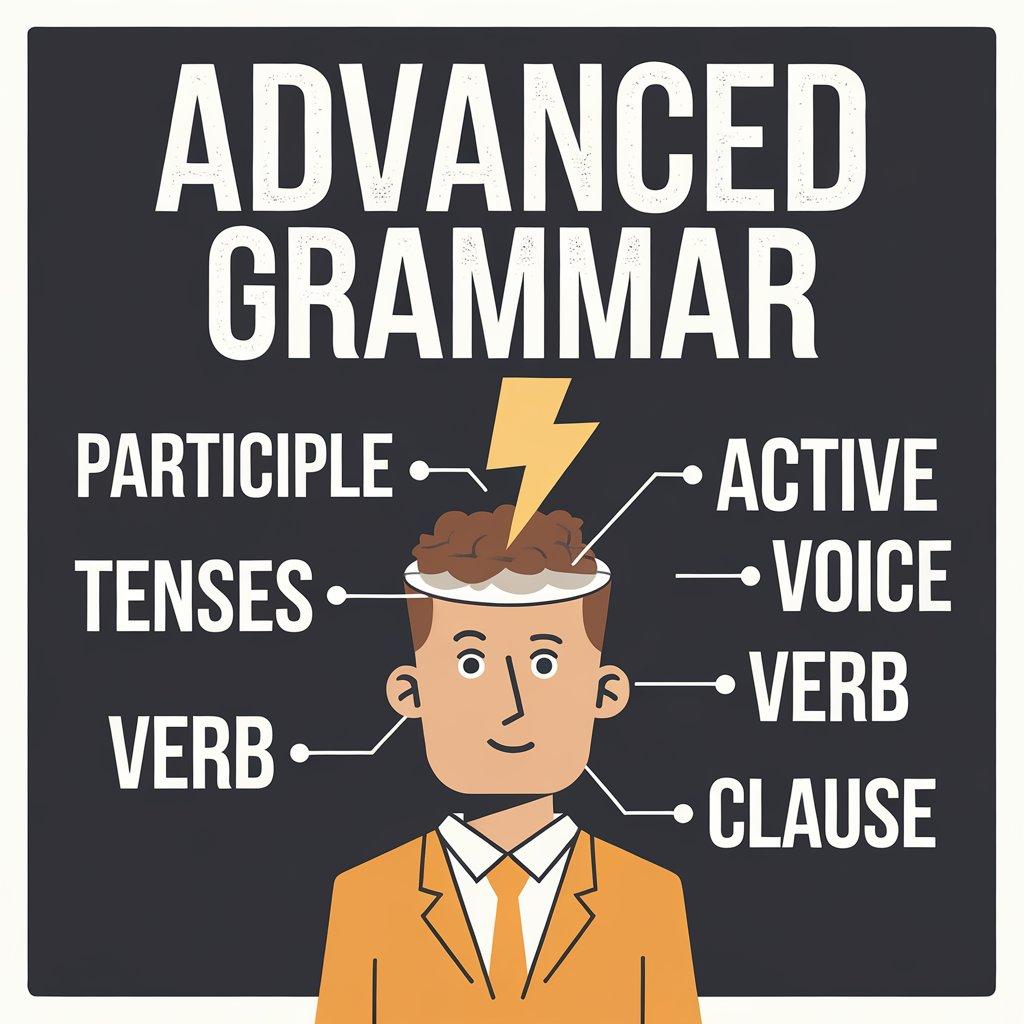
- What is a gerund?
Answer: A verb form ending in “-ing” that functions as a noun (e.g., “Reading is fun”). - What is a participle?
Answer: A verb form used as an adjective (e.g., “The running water,” “The broken chair”). - What is the subjunctive mood in English?
Answer: A verb form used to express wishes, hypothetical situations, or conditions contrary to fact (e.g., “If I were you, I would go”). - What is a cleft sentence?
Answer: A sentence where a part of it is emphasized, often using “it is” or “it was” (e.g., “It was John who broke the vase”). - What is a relative clause?
Answer: A clause that modifies a noun and usually begins with a relative pronoun (e.g., “The book that I read was interesting”). - What is the past perfect continuous tense used for?
Answer: To describe an action that started in the past and continued until another point in the past (e.g., “I had been working when she called”). - What is a modal verb?
Answer: A verb used to express possibility, necessity, or permission (e.g., “can,” “must,” “may”). - What is the future continuous tense used for?
Answer: To describe an action that will be ongoing at a particular time in the future (e.g., “I will be studying at 8 PM”). - What is the passive voice?
Answer: A construction where the object of the action becomes the subject of the sentence (e.g., “The cake was eaten by the children”). - What is the difference between “few” and “a few”?
Answer: “Few” implies a small number, often with a negative connotation, while “a few” implies a small but sufficient number. - What is the meaning of “to take something with a grain of salt”?
Answer: To not take something too seriously or to remain skeptical about it. - What is the difference between “sight” and “site”?
Answer: “Sight” refers to the ability to see, while “site” refers to a location or place. - What is an exclamatory sentence?
Answer: A sentence that expresses strong emotion or excitement (e.g., “What a beautiful day!”). - What is a synonym for “happy”?
Answer: Joyful, content, pleased - What is an antonym for “difficult”?
Answer: Easy - What is the difference between “loose” and “lose”?
Answer: “Loose” means not tight or free, while “lose” means to misplace something. - What is a dangling modifier?
Answer: A word or phrase that is not clearly or logically related to the word it is intended to modify (e.g., “Running late, the bus left without me”). - What is the function of an adjective clause?
Answer: It modifies or gives more information about a noun in the sentence (e.g., “The car that I bought is red”). - What is the difference between “fewer” and “less”?
Answer: “Fewer” is used with countable nouns, and “less” is used with uncountable nouns. - What is the function of the apostrophe in English?
Answer: To indicate possession (e.g., “John’s book”) or to form contractions (e.g., “don’t” for “do not”). - What is the correct use of “there,” “their,” and “they’re”?
Answer: “There” refers to a place, “their” is a possessive pronoun, and “they’re” is a contraction for “they are.” - What is the correct form of the verb in the sentence: “If he (was, were) here, he would help”?
Answer: Were (subjunctive mood for hypothetical situations). - What is the future perfect tense used for?
Answer: To describe an action that will be completed before a certain point in the future (e.g., “By next year, I will have graduated”). - What is the function of a semicolon?
Answer: To link closely related independent clauses or separate items in a complex list. - What is a non-defining relative clause?
Answer: A clause that adds extra information about a noun without changing the meaning of the sentence (e.g., “My brother, who lives in London, is visiting”). - What is the past participle of “go”?
Answer: Gone - What is the present perfect continuous tense used for?
Answer: To describe an action that began in the past and is still continuing or has recently finished (e.g., “I have been studying”). - What is the correct form of “who” in the sentence: “The person to (whom, who) I spoke was helpful”?
Answer: Whom (because it’s the object of the preposition). - What is the past tense of “sing”?
Answer: Sang - What is an adverbial clause?
Answer: A dependent clause that modifies a verb, adjective, or another adverb, typically indicating time, place, reason, or condition (e.g., “I’ll stay home because it’s raining”).
Literature
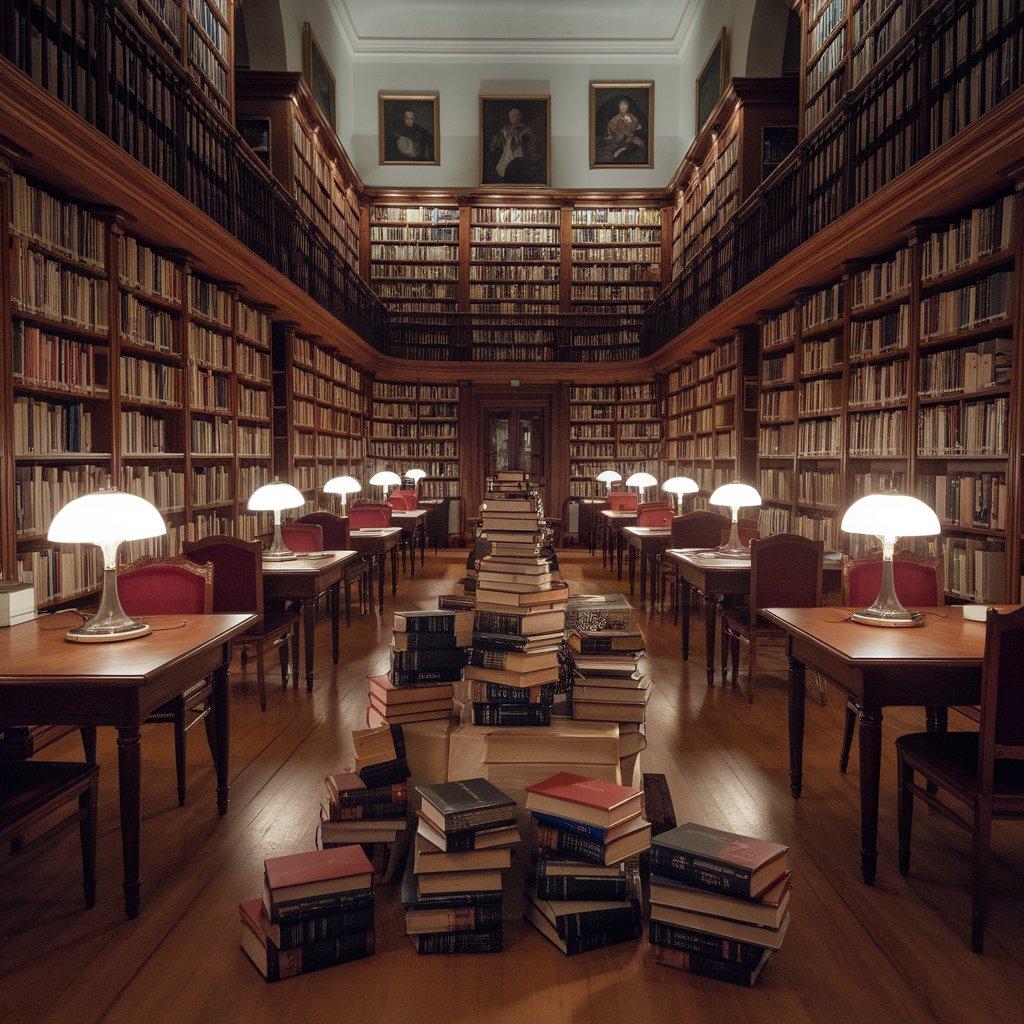
- Who wrote the play Romeo and Juliet?
Answer: William Shakespeare - What is the title of the first book in the Harry Potter series?
Answer: Harry Potter and the Sorcerer’s Stone (also known as Harry Potter and the Philosopher’s Stone in some countries) - Which novel begins with the line, “Call me Ishmael”?
Answer: Moby-Dick by Herman Melville - Who wrote Pride and Prejudice?
Answer: Jane Austen - What genre is Frankenstein by Mary Shelley often classified as?
Answer: Gothic novel - Who wrote the novel 1984?
Answer: George Orwell - Which book is considered J.R.R. Tolkien’s masterpiece about Middle-earth?
Answer: The Lord of the Rings trilogy - What is the title of the first novel by Charles Dickens?
Answer: The Pickwick Papers - Which novel by Harper Lee was published in 1960?
Answer: To Kill a Mockingbird - Who wrote The Catcher in the Rye?
Answer: J.D. Salinger - What was the original title of The Great Gatsby?
Answer: Trimalchio in West Egg (F. Scott Fitzgerald changed the title before publication) - In which novel would you find the character Holden Caulfield?
Answer: The Catcher in the Rye - Who wrote The Picture of Dorian Gray?
Answer: Oscar Wilde - Which author is known for writing The Adventures of Tom Sawyer?
Answer: Mark Twain - What is the title of the 1925 novel by F. Scott Fitzgerald?
Answer: The Great Gatsby - Who wrote the famous novel Wuthering Heights?
Answer: Emily Brontë - Which book features the character Huckleberry Finn?
Answer: Adventures of Huckleberry Finn by Mark Twain - Which novel tells the story of Winston Smith’s rebellion against a dystopian government?
Answer: 1984 by George Orwell - What is the name of the fictional town in Moby-Dick?
Answer: Nantucket - Who is the author of The Odyssey?
Answer: Homer - Which novel begins with the line, “It was the best of times, it was the worst of times”?
Answer: A Tale of Two Cities by Charles Dickens - Who wrote The Brothers Karamazov?
Answer: Fyodor Dostoevsky - Which American author wrote The Grapes of Wrath?
Answer: John Steinbeck - What is the title of the novel in which a character named Scout Finch narrates her childhood?
Answer: To Kill a Mockingbird by Harper Lee - Who wrote The Road?
Answer: Cormac McCarthy - What famous novel by J.R.R. Tolkien features the journey of Frodo Baggins?
Answer: The Lord of the Rings - Who wrote Crime and Punishment?
Answer: Fyodor Dostoevsky - What is the title of Jane Austen’s most famous work?
Answer: Pride and Prejudice - Who is the author of Dracula?
Answer: Bram Stoker - Which dystopian novel features a society where “Big Brother” is always watching?
Answer: 1984 by George Orwell
Authors
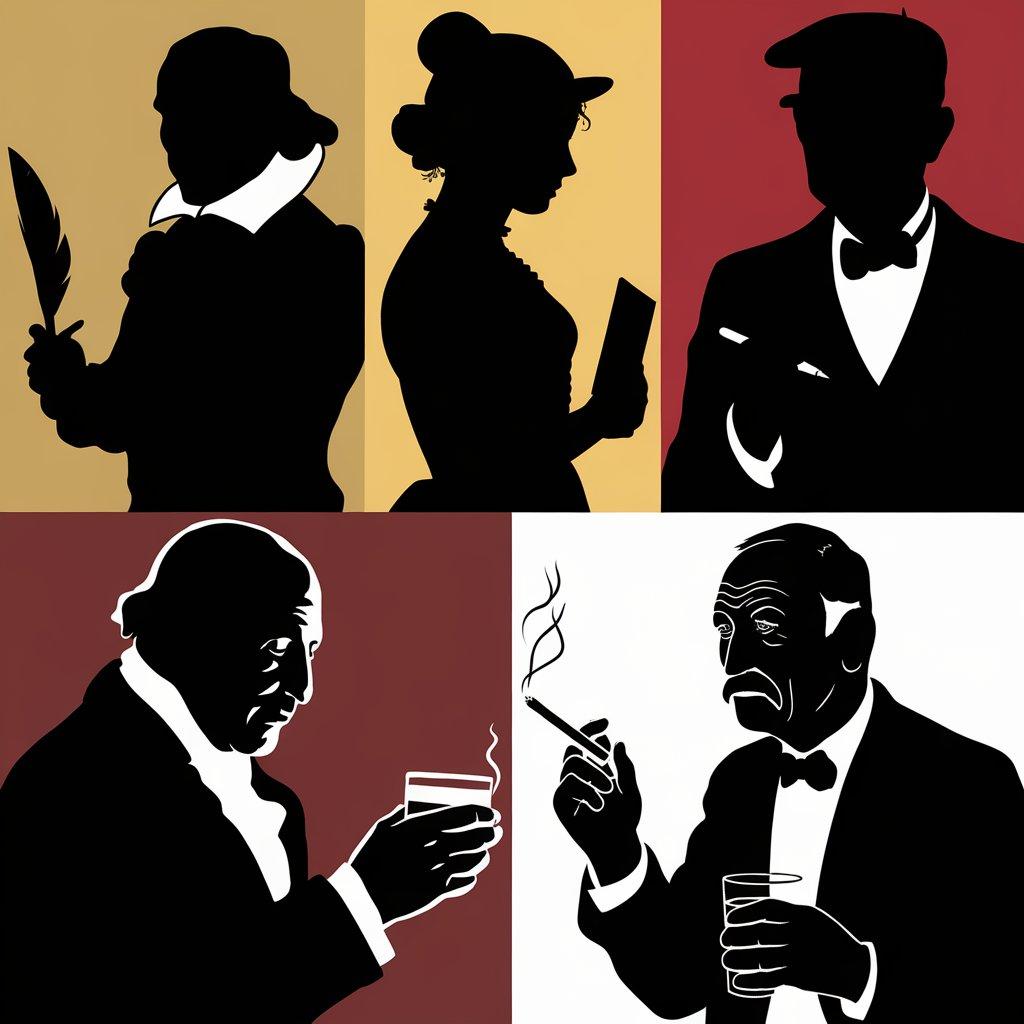
- Who is considered the “father” of the American novel?
Answer: James Fenimore Cooper - Which English author wrote Great Expectations?
Answer: Charles Dickens - Which poet wrote the epic Paradise Lost?
Answer: John Milton - Who is known for writing The Chronicles of Narnia?
Answer: C.S. Lewis - Which poet is famous for the line “Two roads diverged in a yellow wood”?
Answer: Robert Frost - Who is the author of Brave New World?
Answer: Aldous Huxley - Which 19th-century English author wrote Jane Eyre?
Answer: Charlotte Brontë - Who wrote The Hobbit?
Answer: J.R.R. Tolkien - Which famous author was also a well-known journalist and political essayist, penning The Road to Wigan Pier?
Answer: George Orwell - Who wrote The Sun Also Rises?
Answer: Ernest Hemingway - Which author created the character of Sherlock Holmes?
Answer: Sir Arthur Conan Doyle - Who is the author of The Bell Jar?
Answer: Sylvia Plath - Which poet wrote The Raven?
Answer: Edgar Allan Poe - Which author wrote The Hunger Games series?
Answer: Suzanne Collins - Who wrote The Fault in Our Stars?
Answer: John Green - Which writer is known for his Wicked series of novels?
Answer: Gregory Maguire - Who wrote Slaughterhouse-Five?
Answer: Kurt Vonnegut - Which author is known for writing The Old Man and the Sea?
Answer: Ernest Hemingway - Which American author wrote Beloved?
Answer: Toni Morrison - Which English author is famous for creating Harry Potter?
Answer: J.K. Rowling - Who wrote The Call of the Wild?
Answer: Jack London - Which writer is famous for writing Murder on the Orient Express?
Answer: Agatha Christie - Who is the author of The Hitchhiker’s Guide to the Galaxy?
Answer: Douglas Adams - Which 20th-century American author wrote The Grapes of Wrath and Of Mice and Men?
Answer: John Steinbeck - Who wrote Les Misérables?
Answer: Victor Hugo - Which author wrote A Wrinkle in Time?
Answer: Madeleine L’Engle - Which famous author wrote The Shining?
Answer: Stephen King - Who is the author of The Metamorphosis?
Answer: Franz Kafka - Which writer is known for his Dark Tower series?
Answer: Stephen King - Who wrote The Outsiders?
Answer: S.E. Hinton
Famous Quotes
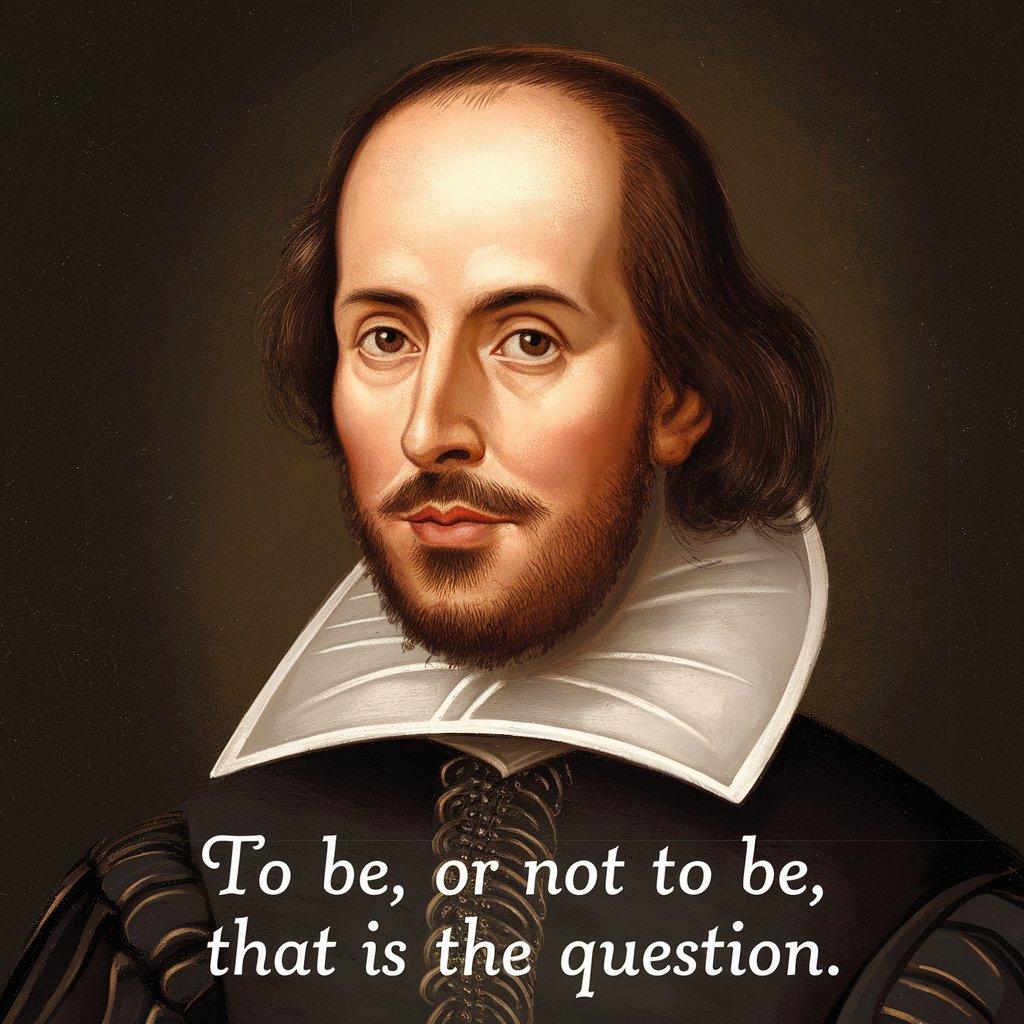
- Who said, “To be, or not to be, that is the question”?
Answer: William Shakespeare (from Hamlet) - Who said, “I think, therefore I am”?
Answer: René Descartes - Who said, “It is never too late to be what you might have been”?
Answer: George Eliot - Who wrote, “All men are created equal”?
Answer: Thomas Jefferson (from the Declaration of Independence) - Who said, “The only thing we have to fear is fear itself”?
Answer: Franklin D. Roosevelt - Who said, “Injustice anywhere is a threat to justice everywhere”?
Answer: Martin Luther King Jr. - Who said, “Not all those who wander are lost”?
Answer: J.R.R. Tolkien (from The Lord of the Rings) - Who said, “Do what you can, with what you have, where you are”?
Answer: Theodore Roosevelt - Who said, “Happiness is not something ready-made. It comes from your own actions”?
Answer: Dalai Lama - Who said, “You must be the change you wish to see in the world”?
Answer: Mahatma Gandhi
Conclusion
Testing your English knowledge isn’t just about getting answers right or wrong—it’s about growing more confident in your language skills.
These 175+ questions give you a clear picture of your strengths and areas where you can improve.
Why does this matter? Strong English skills open doors to better communication, improved writing, and greater success in academic and professional settings. Each question you tackle brings you closer to mastering the language.
Ready to put your skills to the test? Start with the grammar section if you want to build a strong foundation, or jump straight to literature questions if you’re feeling confident.
Remember to review the explanations for any questions you miss—that’s where real learning happens.
Share your scores in the comments below, and let us know which sections you found most helpful!

